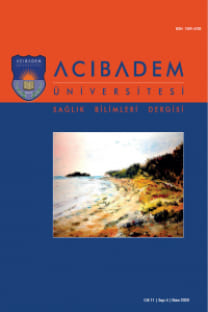Çocuk Yoğun Bakım Ünitesi’ne Yatan Çocukların Ebeveynlerinde Depresyon Durumu
Depression Status In Children's Parents During Hospitalization In The Pediatric Intensive Care Unit
Depression, Pediatric Intensive Care Unit, Family,
___
Goldberg S, Morris P, Simmons RJ, Fowler RS, Levison H. Chronic illness in infancy and parenting stress: a comparison of three groups of parents. J Pediatr Psychol 1990;15:347-58.Guntupalli KK, Rebbapragada VR, Lodhi MH, Bradford S, Burrus J, McCabe D, et al. Anxiety, depression and post-traumatic stress reactions in relatives of intensive care unit patients. Chest 2007;132(4 Suppl):549-50.
Potter LB, Rogler LH, Moscicki EK. Depression among Puerto Ricans in New York City: the Hispanic Health and Nutrition Examination Survey. Soc Psychiatry Psychiatr Epidemiol 1995;30:185-93.
Green MJ, Benzeyal M. Social class differences in anxiety and depression across the life-course: evidence from three cohorts in the west of Scotland. J Epidemiol Community Health 2009;63:19.
Kessler RC, Berglund P, Demler O, Koretz D, Jin R, Merikangas KR, et al. The epidemiology of major depressive disorder: results from the National comorbidity survey replication (NCS-R). JAMA 2003;289:3095-105.
Less IB. Symposium on chronic disease in children. Clinical Assessment: Physical and psychological functioning. Pediatr Clin North Am 1984;31:33-45.
Akçakın M, Erden G. Psychiatric symptoms in parents of children diagnosed with autism. Turk J Child Adolesc Ment Health 2001;8:2-10.
Bilal E, Dağ İ. The comparison of stress, locus of control and coping styles in mothers of children with mild mental disability and in mothers typically developing children. Turk J Child Adolesc Ment Health 2005;12:69-74.
Sharghi A, Karbakhsh M, Nabaei B, Meysamie A, Farrokhi AR. Depression in mothers of children with thalassemia or blood malignancies:a study from Iran. CPEMH 2006;2:27.
Padovani FHP, Linhares MBM, Carvalho AEV, Duarte G, Martinez FE. Anxiety and depression symptoms assessment in pre-term neonates’ mothers during and after hospitalization in neonatal intensive care unit. Rev Bras Psiquiatr 2004;26:251-4.
Gönülal D, Yalaz M, Köroğlu Ö, Kültürsay N. Both parents of neonatal intensive care unit patients are at risk of depression. Turkish J Pediatr 2014;56:171-6.
Curley MA, Meyer EC, Scoppettuolo LA, McGann EA, Trainor BP. Parent presence during invasive procedures and resucitation: evaluating a clinical practice change. Am J Respir Crit Care Med 2012;186:1133-9.
- ISSN: 1309-470X
- Yayın Aralığı: 4
- Başlangıç: 2010
- Yayıncı: ACIBADEM MEHMET ALİ AYDINLAR ÜNİVERSİTESİ
Bir Huzurevindeki Yaşlılara Verilen Eğitimin Ağız ve Diş Sağlığı Üzerine Etkisi
Saime EROL, Fatma Nevin ŞİŞMAN, Ayşe SEZER, İlknur ŞENTÜRK, Münevver AYDIN
Cerrahi Sonrası Ağrı Insidansı ve Analjezik Kullanım Miktarının Belirlenmesi
Kadriye ACAR, Hüseyin ACAR, Figen DEMİR, Fatma Eti ASLAN
Hemşirelik Öğrencilerinin Meslek Seçimi ve Etkileyen Faktörler
Afitap ÖZDELİKARA, Seval AĞAÇDİKEN, Ebru AYDIN
Migren Hastalarında Sigara İçiminin Atak Sıklığı Üzerine Etkisi
Yeşim Guzey ARAS, Belma Doğan GÜNGEN, Dilcan KOTAN, Adil Can GÜNGEN
Obezitede Lipid Metabolizması İle İlgili Micro RNA’lar
Metin Onur BEYAZ, Didem Melis ÖZTAŞ, Murat UĞURLUCAN, Ömer Ali SAYIN, Murat BAŞARAN, Hüseyin OFLAZ, Dilek YILMAZBAYHAN, Bilge BİLGİÇ, Enver DAYIOĞLU
Elçin AYDIN, Hasan YERLİ, Aslı MURATLI
Çocuk Yoğun Bakım Ünitesi’ne Yatan Çocukların Ebeveynlerinde Depresyon Durumu
Seher ERDOĞAN, Arzu OTO, Mehmet BOŞNAK
